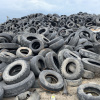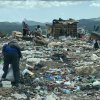The Plastic Waste Free Islands (PWFI) project conducted a policy analysis in Antigua and Barbuda, Grenada and Saint Lucia as part of the supporting actions to improve the management of plastic waste in the countries. The objective of the analysis was to look at current policies and legislation and generate recommendations to inform the development of policy and solutions that target the reduction of plastic waste within the respective countries’ waste stream.
The analysis broke up into two (2) key components. The first was to undertake a review of current plastic waste management instruments, including a study of international and regional conventions that set up guidelines to allow countries to better manage their waste, and identify international and regional organisations, as well as other initiatives that are working to implement these conventions or on mitigating plastic waste. The second part consisted on developing policy recommendations, considering the requirements of the current plastic waste management instruments and the results of IUCN’s material flow analysis, which can help with the countries’ approach to plastic waste management in the tourism, fisheries and waste management sectors.
The analysis was conducted using a participatory approach. Targeted stakeholders were government representatives, including Ministries that are involved in the implementation of legislation and policy, the private sector, including those businesses and companies that are also involved in the implementation and co-management of some of these approaches, and civil society. Most of the work focused in a desk review of current legislation, looking to see where gaps existed and where policy could be strengthened. As well, there was outreach to stakeholders using surveys and virtual consultation meetings; in this way, the solutions for each sector were co-developed and can be implemented with the government and key stakeholders.
With this analysis, PWFI is now reaching completion of the project’s assessment and knowledge gathering phase. As for next steps, the project aims to organise more focused discussions at the national levels, and obtain information on how to move forward with identified solutions. The project will further engage with key stakeholders and supporting partners, to co-develop an action plan for each of the project’s sectors on enhanced plastic waste management. A collective framework for action and timeline for implementation of the recommendations will be identified, to encourage synergy between the three sectors, to work in collaboration, devise and implement these practical solutions.
****
About Plastic Waste Free Islands
The Plastic Waste Free Islands (PWFI) project seeks to address the problem of plastic waste leakage from island states. To this aim, the project works in three regions: the Caribbean, the Mediterranean and Oceania, to promote a significant, quantified reduction in plastic waste leakage within the planned project timeframe of three years.
In 2019, with support of the Norwegian Agency for Development Cooperation (Norad) and the Didier and Martine Primat Foundation, IUCN launched the PWFI project, as part of its global Close the Plastic Tap Programme. In the Caribbean Region, the project is being implemented by IUCN’s Regional Office for Mexico, Central America and the Caribbean (IUCN ORMACC), focuses on Antigua and Barbuda, Grenada, and Saint Lucia, and involves participation of the country governments, as well as regional partner, the Organisation of Eastern Caribbean States (OECS).
The PWFI project seeks to drive the circular economy agenda forward and to reduce plastic waste generation and leakage from the islands. In order to achieve this, the project has selected three plastic waste-related sectors to allow for comparison and best practice sharing: tourism, fisheries and waste management.





